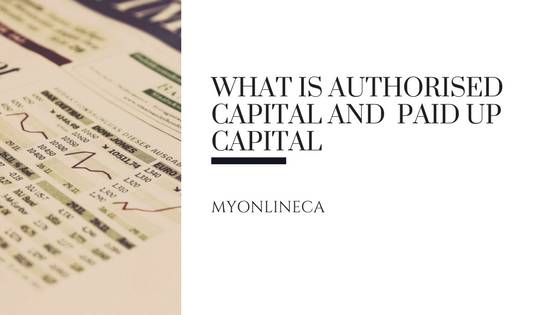Whenever there is a talk of any company by any individual or a subject matter expert etc, you must have heard terms like authorised capital and paid up capital of a company. Some of you must be familiar with these terms and what is their meaning. But if you are not familiar with these terms in this article we will explain you in details about Authorised Capital Vs Paid up Capital.
In this, the article we will provide you much-needed information regarding authorised capital and paid Up capital.
What Is Authorised Capital?
Authorised share capital also known as Registered capital or Nominal capital can be defined as the largest amount of share capital that a company can issue. This amount will be agreed on when the company is being incorporated. Again, this amount can be increased at a later date if the shareholders wish.It is the maximum amount of capital which a company can raise by issuing shares.It is the amount up to which a company can issue shares.
Features of an Authorised Capital.
- Authorised capital is decided at Formation and incorporation of the company.
- As the number of authorized capital increases, ROC fees will also increase.
- Authorised Capital is mentioned in the Memorandum of Association and Articles of Association of the Company.
- The authorised share capital denotes the amount of share capital that the company can have and set as the nominal value of each share.
- It can be changed at any point in time after incorporation of the company.
- Authorised capital cannot be used in the calculation of net worth of the company.
- It is not required for a company to issue shares up to authorised capital, the company can issue shares of less value than authorized capital.
What is Paid Up Capital
The amount of capital against which the company has received the payments from the shareholders is known as Paid Up Capital.Paid-up capital is created when a company sells its shares.As a company cannot issue shares above it authorized capital, Paid up capital will always be less than authorized capital.Paid up capital can be fully paid up and partly paid up.
Features of Paid-Up Capital
- It falls in the category of Called up capital which has been actually paid by the shareholders and received by the company.
- It is mandatory for the company to issue shares within 60 days of incorporation of the company, the amount decided as paid-up capital during incorporation.
- Paid up capital cannot be more than authorized capital.
- The amount received as a paid-up capital can be used for meeting business expenses of the company.
- Paid up capital is included in the calculation of net worth of the company.
Tip : Do you know that now in the Private Limited Company Registration you have not required the minimum 1 lakh rupees capital. so its mean you can start your own company with any amount of the capital. even there are some other rules also changed in the companies act 2013 regarding the registered office of the company.
Authorised Capital Vs Paid Up Capital
- A paid-up capital is included in the authorized capital.
- Authorised capital is the maximum value of shares that a company can allot to its shareholders and Paid-up Capital is the total capital the company has raised through issue of shares.
- A paid-up capital value should not exceed the value of the authorized capital.
- The authorised capital can be increased anytime with the prior permission of the shareholders.
- Authorised and paid-up capital both are shown on balance sheet of a company but only Paid up capital is used to calculate companies net worth.
Further Help
We hope that we must have done a successful job in providing information related to Authorised and Paid-up capital. But still, you have any doubt or queries or want any legal help regarding any issue related to your company do check out our Company Registration Services and website at MyOnlineCa.
